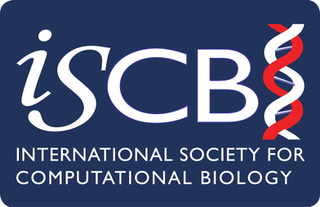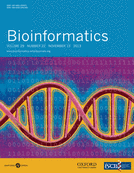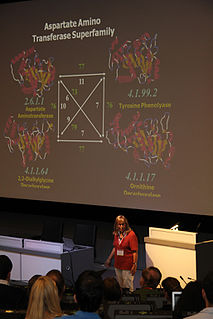
Bioinformatics is an interdisciplinary field that develops methods and software tools for understanding biological data, in particular when the data sets are large and complex. As an interdisciplinary field of science, bioinformatics combines biology, chemistry, physics, computer science, information engineering, mathematics and statistics to analyze and interpret the biological data. Bioinformatics has been used for in silico analyses of biological queries using computational and statistical techniques.
Vasant G. Honavar is an Indian born American computer scientist, and artificial intelligence, machine learning, big data, data science, causal inference, knowledge representation, bioinformatics and health informatics researcher and professor.
King-Sun Fu was a Chinese-born American computer scientist. He was a Goss Distinguished Professor at Purdue University School of Electrical and Computer Engineering in West Lafayette, Indiana. He was instrumental in the founding of International Association for Pattern Recognition (IAPR), served as its first president, and is widely recognized for his extensive contributions to- and a pioneer in- the field of pattern recognition and machine intelligence. In honor of the memory of Professor King-Sun Fu, IAPR gives the biennial King-Sun Fu Prize to a living person in the recognition of an outstanding technical contribution to the field of pattern recognition. The first King-Sun Fu Prize was presented in 1988, to Azriel Rosenfeld.

Intelligent Systems for Molecular Biology (ISMB) is an annual academic conference on the subjects of bioinformatics and computational biology organised by the International Society for Computational Biology (ISCB). The principal focus of the conference is on the development and application of advanced computational methods for biological problems. The conference has been held every year since 1993 and has grown to become one of the largest and most prestigious meetings in these fields, hosting over 2,000 delegates in 2004. From the first meeting, ISMB has been held in locations worldwide; since 2007, meetings have been located in Europe and North America in alternating years. Since 2004, European meetings have been held jointly with the European Conference on Computational Biology (ECCB).

The International Society for Computational Biology (ISCB) is a scholarly society for researchers in computational biology and bioinformatics. The society was founded in 1997 to provide a stable financial home for the Intelligent Systems for Molecular Biology (ISMB) conference and has grown to become a larger society working towards advancing understanding of living systems through computation and for communicating scientific advances worldwide.

Bioinformatics is a biweekly peer-reviewed scientific journal covering research and software in bioinformatics and computational biology. It is the official journal of the International Society for Computational Biology (ISCB), together with PLOS Computational Biology. Authors can pay extra for open access and are allowed to self-archive after 1 year.
Bir Bhanu is the Marlan and Rosemary Bourns Endowed University of California Presidential Chair in Engineering, the Distinguished Professor of Electrical and Computer Engineering, and Cooperative Professor of Computer Science and Engineering, Mechanical Engineering and Bioengineering, at the Marlan and Rosemary Bourns College of Engineering at the University of California, Riverside (UCR). He is the first Founding Faculty of the Marlan and Rosemary Bourns College of Engineering at UCR and served as the Founding Chair of Electrical Engineering from 1/1991 to 6/1994 and the Founding Director of the Center for Research in Intelligent Systems (CRIS) from 4/1998 to 6/2019. He has been the director of Visualization and Intelligent Systems Laboratory (VISLab) at UCR since 1991. He was the Interim Chair of the Department of Bioengineering at UCR from 7/2014 to 6/2016. Additionally, he has been the Director of the NSF Integrative Graduate Education, Research and Training (IGERT) program in Video Bioinformatics at UC Riverside. Dr. Bhanu has been the principal investigator of various programs for NSF, DARPA, NASA, AFOSR, ONR, ARO and other agencies and industries in the areas of object/target recognition, learning and vision, image/video understanding, image/video databases with applications in security, defense, intelligence, biological and medical imaging and analysis, biometrics, autonomous navigation and industrial machine vision.
SciEngines GmbH is a privately owned company founded 2007 as a spin-off of the COPACOBANA project by the Universities of Bochum and Kiel, both in Germany. The project intended to create a platform for an affordable Custom hardware attack. COPACOBANA is a massively-parallel reconfigurable computer. It can be utilized to perform a so-called Brute force attack to recover DES encrypted data. It consists of 120 commercially available, reconfigurable integrated circuits (FPGAs). These Xilinx Spartan3-1000 run in parallel, and create a massively parallel system. Since 2007, SciEngines GmbH has enhanced and developed successors of COPACOBANA. Furthermore, the COPACOBANA has become a well known reference platform for cryptanalysis and custom hardware based attacks to symmetric, asymmetric cyphers and stream ciphers. 2008 attacks against A5/1 stream cipher an encryption system been used to encrypt voice streams in GSM have been published as the first known real world attack utilizing off-the-shelf custom hardware.

The European Conference on Computational Biology (ECCB) is a scientific meeting on the subjects of bioinformatics and computational biology. It covers a wide spectrum of disciplines, including bioinformatics, computational biology, genomics, computational structural biology, and systems biology. ECCB is organized annually in different European cities. Since 2007, the conference has been held jointly with Intelligent Systems for Molecular Biology (ISMB) every second year. The conference also hosts the European ISCB Student Council Symposium. The proceedings of the conference are published by the journal Bioinformatics.
Visakan Kadirkamanathan is a professor of Signal and Information Processing at the Department of Automatic Control and Systems Engineering at the University of Sheffield, United Kingdom. He is director of the Rolls-Royce supported University Technology Centre in Control, Monitoring and Systems Engineering and is a founding member of the University Centre for Signal Processing and Complex Systems. From April 2009 to August 2014, he was Head of the Department of Automatic Control and Systems Engineering. He is known for his contribution to the field of statistical signal processing applied to system identification, signal estimation, and fault detection. Kadirkamanathan is the Co-editor of International Journal of Systems Science.
Research in Computational Molecular Biology (RECOMB) is an annual academic conference on the subjects of bioinformatics and computational biology. The conference has been held every year since 1997 and is a major international conference in computational biology, alongside the ISMB and ECCB conferences. The conference is affiliated with the International Society for Computational Biology. Since the first conference, authors of accepted proceedings papers have been invited to submit a revised version to a special issue of the Journal of Computational Biology.

The International Conference on Computational Intelligence Methods for Bioinformatics and Biostatistics (CIBB) is a yearly scientific conference focused on machine learning and computational intelligence applied to bioinformatics and biostatistics.
PRIA, the International Conference on Pattern Recognition and Image Analysis, is a biennial scientific international conference organized by the Russian Academy of Sciences and Springer Science+Business Media. It is officially sponsored by the International Association for Pattern Recognition. The conference areas are pattern recognition, image analysis, computer vision, and artificial intelligence. The conference usually includes the meeting of IAPR Technical Committee 16 "Algebraic and Discrete Mathematical Techniques in Pattern Recognition and Image Analysis".
The International Association for Pattern Recognition (IAPR) is an international association of non-profit, scientific, or professional organizations concerned with pattern recognition, computer vision, and image processing in a broad sense. Normally, only one organization is admitted from any one country, and individuals interested in taking part in IAPR's activities may do so by joining their national organization.
Dov Dori is an Israeli-American computer scientist, and Professor of Information Systems Engineering at Technion – Israel Institute of Technology, known for the development of Object Process Methodology (OPM). The ideas underlying OPM were published for the first time in 1995.

Gad Menahem Landau is an Israeli computer scientist noted for his contributions to combinatorial pattern matching and string algorithms and is the founding department chair of the Computer Science Department at the University of Haifa.
Narayanaswamy Srinivasan was an Indian molecular biophysicist and a professor and the head of Proteins: Structure, Function and Evolutionary Group at the Molecular Biophysics Unit of the Indian Institute of Science. He is known for his researches in the fields of computational genomics and protein structure analysis. An elected fellow of the Indian Academy of Sciences and the National Academy of Sciences, India, he is a J. C. Bose National fellow of the Department of Biotechnology and a recipient of the National Bioscience Award for Career Development of the Department of Science and Technology. The Council of Scientific and Industrial Research, the apex agency of the Government of India for scientific research, awarded him the Shanti Swarup Bhatnagar Prize for Science and Technology, one of the highest Indian science awards, in 2007, for his contributions to biological sciences.
Sushmita Mitra is an Indian computer scientist and is currently the head and INAE Chair Professor at the Machine Intelligence Unit at Indian Statistical Institute, Kolkata. Her research interests include pattern recognition, data mining, bioinformatics, soft computing and medical imaging. She got recognised as a fellow of IEEE for her neuro-fuzzy and hybrid approaches in pattern recognition.

Maja Pantić is a Professor of Affective and Behavioural Computing at Imperial College London and an AI Scientific Research Lead in Facebook London. She was previously Professor of Affective and Behavioural Computing University of Twente and Research Director of the Samsung AI lab in Cambridge, UK. She is an expert in machine understanding of human behaviour including vision-based detection and tracking of human behavioural cues like facial expressions and body gestures, and multimodal analysis of human behaviours like laughter, social signals and affective states.
Ramasubbu Sankararamakrishnan is an Indian computational biologist, bioinformatician and a professor at the Department of Biological Sciences and Bioengineering of the Indian Institute of Technology, Kanpur. He is known for his computational studies on membrane protein function. The Department of Biotechnology of the Government of India awarded him the National Bioscience Award for Career Development, one of the highest Indian science awards, for his contributions to biosciences in 2008.







